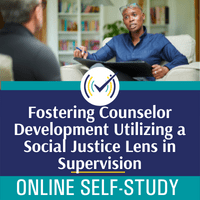1.5 CE Credits available for behavioral health clinicians
As the counseling field has working to address historical issues of inequities, discrimination, and marginalization, it is imperative to continue the exploration of counselor development and its impact. Counselor identity development is crucial to the work of counselors, as it informs counselors' work with their clients (Moss et al., 2014).
Moreover, supervision is a critical component of counselor development. Currently, the ACES Best Practices in Clinical Supervision (ACES, 2011) details how supervisors should approach supervision with counselors. While the document does address diversity and multicultural issues, it is limiting on how to effectively work with counselors given recent compounded issues such as the pandemic and social injustices. The focus of this presentation is to focus on how to utilize a social justice lens in supervision to aid in counselor development.
- Fostering Counselor Development Utilizing a Social Justice Lens in Supervision
- Description
- Learning Objectives
- Instructor
- CE Hours
- How to Complete the Course and Earn CEs
- Course Policies
- Who Should Attend
- Teaching Methods
- Course Availability
Select each tab above to view specific details of this course
As the counseling field has working to address historical issues of inequities, discrimination, and marginalization, it is imperative to continue the exploration of counselor development and its impact. Counselor identity development is crucial to the work of counselors, as it informs counselors' work with their clients (Moss et al., 2014).
Moreover, supervision is a critical component of counselor development. Currently, the ACES Best Practices in Clinical Supervision (ACES, 2011) details how supervisors should approach supervision with counselors. While the document does address diversity and multicultural issues, it is limiting on how to effectively work with counselors given recent compounded issues such as the pandemic and social injustices. The focus of this presentation is to focus on how to utilize a social justice lens in supervision to aid in counselor development.
This course was recorded February 11, 2022
Upon completion of this training professionals will be able to do the following:
Identify at least one social justice model that they can implement in supervision.
Discuss ways in which to assess counselor development.
Candice Crawford, PhD, LMHC
Dr. Candice R. Crawford is an Assistant Professor in the Clinical Mental Health Counseling Program at Molloy College. Dr. Crawford is also a Licensed Mental Health Counselor (LMHC) in the state of New York and has worked in various capacities as a bilingual counselor working with children, adolescents, and their families. Also, she has served as a clinical supervisor and program director in outpatient substance abuse facilities. Currently, she owns a private practice in the Bronx where she works with women of color who have endured trauma. Her research interests include multicultural competence in counseling and supervision, cross-racial supervision, and social justice advocacy. She is involved in numerous research projects and has presented research findings at regional and national conferences. She has mentored students exploring the relationship between self-esteem and bilingualism. Additionally, she is active in numerous counseling associations including the counseling honor society, Chi Sigma Iota (CSI), where she is the Chapter Faculty Advisor, and was also chosen as one of CSI's international leadership fellows. Recently, she was elected Secretary-Elect for the North Atlantic Region Association for Counselor Education and Supervision (NARACES). Lastly, she is involved in several school and college-wide committees at Molloy College that promotes interdisciplinary learning and collaboration, as well as promoting mentoring for faculty.
Credit Hours: This course consists of 1.5 ethics credit hours.
Counselors: Telehealth Certification Institute, LLC has been approved by NBCC as an Approved Continuing Education Provider, ACEP No, 6693. Programs that do not qualify for NBCC credit are clearly identified. Telehealth Certification Institute, LLC is solely responsible for all aspects of the programs.
Telehealth Certification Institute, LLC is recognized by the New York State Education Department's State Board for Mental Health Practitioners as an approved provider of continuing education for licensed mental health counselors. #MHC-0048. Approval renewal date: 1/31/2023
Marriage and Family Therapists: Many MFT licensing boards accept our courses or one of the approvals which we have from professional associations. You can check with your board to determine if this course would be accepted by your licensing board.
Social Workers: Telehealth Certification Institute LLC, #1609, is approved to offer social work continuing education by the Association of Social Work Boards (ASWB) Approved Continuing Education (ACE) program. Organizations, not individual courses, are approved as ACE providers. State and provincial regulatory boards have the final authority to determine whether an individual course may be accepted for continuing education credit. Telehealth Certification Institute LLC maintains responsibility for this course. ACE provider approval period: 05/02/2021 – 05/02/2024. Social workers completing this course receive 1.5 ethics continuing education credits.
Telehealth Certification Institute, LLC is recognized by the New York State Education Department's State Board for Social Work as an approved provider of continuing education for licensed social workers #SW-0435. Approval renewal date: 2/28/2023
Addiction Professionals: Telehealth Certification Institute is an approved provider of continuing education by NAADAC, The Association for Addiction Professionals, provider #193104, effective 02/23/2021. Full attendance is required; no partial credit will be awarded for partial attendance.
Psychologists: Telehealth Certification Institute LLC is approved by the American Psychological Association to sponsor continuing education for psychologists. Telehealth Certification Institute LLC maintains responsibility for this program and its content.
Telehealth Certification Institute, LLC is recognized by the New York State Education Department’s State Board for Psychology as an approved provider of continuing education for licensed psychologists #PSY-0128. Effective 8/31/2021 – 8/31/2024
Art Therapists: Telehealth Certification Institute, LLC is recognized by the New York State Education Department's State Board for Mental Health Practitioners as an approved provider of continuing education for licensed creative arts therapists #CAT-0093. 7/21/2021 – 7/31/2024
Other Professionals: This activity qualifies for 90 minutes of instructional content as required by many national, state and local licensing boards and professional organizations. Retain your certificate of completion and contact your board or organization for specific filing requirements.
This is a non-interactive, self-study course.
To receive your certificate of completion you must complete the course in its entirety.
Online courses are completed by registering, logging in, navigating to your course using the menu (My Courses – the Course Title), completing all of the modules, completing and passing the post-test, and completing the course evaluation.
Live Webinar courses are completed by registering, logging in to this website, navigating to your course using the menu (My Courses – the Course Title), attending the full course via webinar, submitting your attendance, and completing the post-test and course evaluation online.
Psychologists and other professionals seeking CE credit through our approval with the American Psychological Association are asked, but not required, to complete the course evaluation before obtaining their certificate of completion, however passing a post-test for online self-study courses, and submitting one's attendance for live on-site and live webinars is required.
You can receive your certificate of completion by logging onto this website, navigating to the course using the menu (My Courses – the Course Title), scroll to the bottom of your course, and click on your certificate to either download it or print it.
Directions for completing a course can be found by clicking here.
Accommodations for Individuals with Disabilities
Click here to view our Accommodations for Individuals with Disabilities.
Cancellation Policy
Refunds are offered within the first 30 days for courses which have not been completed. There is a $25 service fee for refunds.
Grievance Policy
This course is intended for clinicians who provide behavioral health services.
Teaching methods for this course include recorded lectures, videos, a post-test, and a course evaluation. The course may include required reading.
This program was recorded on February 11, 2022
You have six months to access online courses from the time of purchase.

Candice Crawford
PhD, LMHC
Dr. Candice R. Crawford is an Assistant Professor in the Clinical Mental Health Counseling Program at Molloy College. Dr. Crawford is also a Licensed Mental Health Counselor (LMHC) in the state of New York and has worked in various capacities as a bilingual counselor working with children, adolescents, and their families. Also, she has served as a clinical supervisor and program director in outpatient substance abuse facilities. Currently, she owns a private practice in the Bronx where she works with women of color who have endured trauma. Her research interests include multicultural competence in counseling and supervision, cross-racial supervision, and social justice advocacy. She is involved in numerous research projects and has presented research findings at regional and national conferences. She has mentored students exploring the relationship between self-esteem and bilingualism. Additionally, she is active in numerous counseling associations including the counseling honor society, Chi Sigma Iota (CSI), where she is the Chapter Faculty Advisor, and was also chosen as one of CSI's international leadership fellows. Recently, she was elected Secretary-Elect for the North Atlantic Region Association for Counselor Education and Supervision (NARACES). Lastly, she is involved in several school and college-wide committees at Molloy College that promotes interdisciplinary learning and collaboration, as well as promoting mentoring for faculty.




The course was so informative and I was glued to my screen for the entire duration. I received so much knowledge concerning ethics in telehealth and I am greatly encouraged to read about all the standards and policies that pertain to my practice. Thank you!.